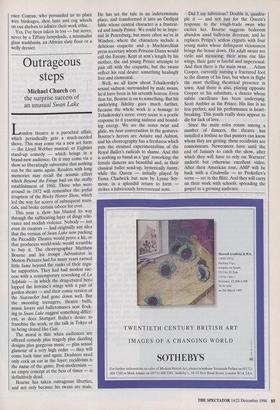Outrageous steps
Michael Church on the surprise success of an unusual Swan Lake London theatre is a parochial affair, which periodically gets a much-needed shove. This may come via a new art form — the Lloyd Webber musical, or Eighties stand-up comedy — which brings in a brand-new audience. Or it may come via a show so liberatingly subversive that nothing can be the same again. Readers with long memories may recall the seismic effect which Beyond the Fringe had on the stuffy establishment of 1960. Those who were around in 1972 will remember the joyful irruption of the Rocky Horror Show, which led the way for scores of subsequent musi- cals, and broke certain taboos for ever. This year a show has blasted its way through the suffocating layer of dingy rele- vance and modish violence. Nobody — not even its creators — had originally any idea that the version of Swan Lake now packing the Piccadilly Theatre would prove a hit, or that producers world-wide would scramble to buy it. The choreographer Matthew Bourne and his troupe Adventures in Motion Pictures had for many years earned little fame beyond the ranks of their regu- lar supporters. They had had modest suc- cess with a contemporary reworking of La Sylphide — in which the drug-crazed hero lopped the heroine's wings with a pair of garden shears — and their comic version of the Nutcracker had gone down well. But the swooning teenagers, theatre buffs, music lovers and balletomanes now flock- ing to Swan Lake suggest something differ- ent, as does Stuttgart Ballet's desire to franchise the work, or the talk in Tokyo of its being cloned like Cats. The moral is this: when audiences arc offered comedy plus tragedy plus dazzling designs plus gorgeous music — plus sexual glamour of a very high order — they will come back time and again. Doubters need only cock an ear in the foyer: recidivism is the name of the game. Post-modernism — an empty concept at the best of times — is definitively dead.
Bourne has taken outrageous liberties, and not only because his swans are male. He has set the tale in an indeterminate place, and transformed it into an Oedipal fable whose central character is a frustrat- ed and lonely Prince. We could be in impe- rial St Petersburg, but more often we're in Windsor, where the characters include a delicious coquette and a Machiavellian press secretary whom Princess Diana would call the Enemy. Kept at arm's length by his mother, the sad young Prince attempts to pair off with the coquette, but the swans reflect his real desire: something healing,ly free and elemental.
Well, we all know about Tchaikovsky's sexual sadness: surrounded by male swans, he'd have been in his seventh heaven. Even thus far, Bourne is on to something. But his underlying fidelity goes much further, because the whole work is a homage to Tchaikovsky's score: every scene is a poetic response to it yearning sadness and bound- ing energy. We see the notes twist and glide, we hear conversation in the gestures. Bourne's heroes are Astaire and Ashton, and his choreography has a freshness which puts the strained experimentalism of the Royal Ballet's radicals to shame. And this is nothing so banal as a 'gay' reworking: the female dancers are beautiful and, in their classical ballet send-up, hysterically funny, while the Queen — initially played by Fiona Chadwick but now by Lynne Sey- mour, in a splendid return to form — strikes a lubriciously heterosexual note. Did I say lubricious? Double it, quadru- ple it — and not just for the Queen's response to the rough-trade swan who excites her. Bourne suggests bedroom abandon amid ballroom decorum, and he replaces Petipa's sexless cygnets with four young males whose delinquent viciousness brings the house down. His adult swans are virile and menacing: their arms rise like wings, their gaze is fateful and impersonal. And then there is the main swan. .. Adam Cooper, currently nursing a fractured foot to the dismay of his fans, but when in flight the most thrilling theatrical presence in town. And there is also, playing opposite Cooper or his substitute, a dancer whose subtle excellence has been undersung: Scott Ambler as the Prince. His line is no less perfect, and his performance is heart- breaking. This youth really does appear to die for lack of love.
Since the main roles rotate among a number of dancers, the theatre has installed a hotline so that punters can know whom they are getting: these recidivists are connoisseurs. Newcomers have until the end of January to catch the show, after which they will have to rely on Warners' underlit but otherwise excellent video. After their American tour, AMP will be back with a Cinderella — to Prokofiev's score — set in the Blitz. And they will carry on their work with schools: spreading the gospel to a growing audience.


















































































































 Previous page
Previous page